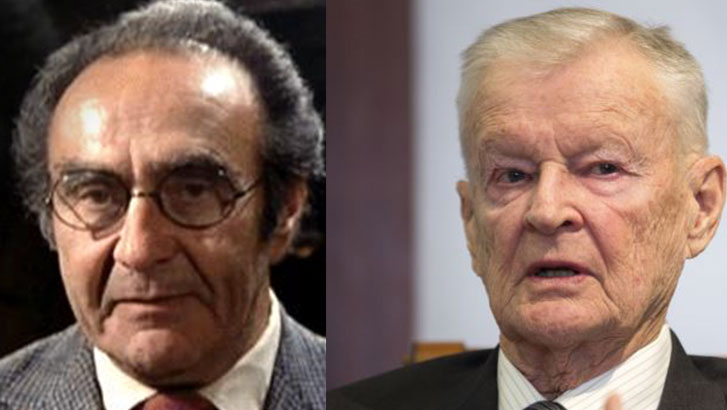The Tale of two emigrants
Consequent upon the end of the WWI, the interregnum in Russian Poland and the rise of Nazis thereafter in Germany, most of the Jews had to leave that part of Europe in an attempt to escape persecution; incarceration and torture in concentration camps and gallows of the extermination camps. Many of that ilk, once on the run to save lives, happened to be the persons of indomitable impact on the world at large. The lot is known as the emigrant Jews. Two of the lot—Albert Einstein and Henry Kissinger—are household names now. But there were others too—though less known—whose intellectual prowess was not less impeccable.
Zbigniew Brzezinski, one of them, died last Sunday (May 26 this year). Jacob Bronowski died on August 22, 1974. Both the emigrants were men of Jewish Polish heritage—the former was destined to be the emigrant to the US and the later to the UK. Both scholars par excellence, unorthodox and visionary in their academic pursuits, having age long advocacy in common for intellectual agility and unrestrained freedom of inquiry in their respective domains of knowledge. Zbigniew Brzezinski — a prolific writer and widely acclaimed expert in the fields of global politics, security and foreign policy— authored over two dozen books, and articles running into hundreds, on the issues of global politics, security, foreign policy and political systems. Jacob Bronowski, primarily a mathematician, wrote several books on poetry, art, philosophy and human history exposing that the dichotomy between human arts and sciences is unintelligible, absurd and meaningless. Both strived for casting knowledge and power in novel, unique and unorthodox moulds in their own way.
For many, the death of Zbigniew Brzezinski, who had served as National Security Advisor to US President Jimmy Carter, might have been a great loss to the fields of the diplomacy, security and strategy of world politics, but for me the world stands deprived of a political scientist of exceptional vision and acumen.
His book ‘The Grand Failure: Birth and Death of Communism in 20th Century’ is a wonderful critique of Marxist ideology and its inherent contradictions. For him, the most fundamental flaw is that Communism is a hierarchical control mechanism, a form of totalitarianism in which political stability is achieved at the expense of economic wellbeing and if economic stability is gained it is always at the expense of political stability, one eroding the other to cause a paradoxical situation in which chasm between the two remains unbridgeable forever.
Other books like ‘Out of Control’, ‘Second Chance’ and Chessboard, though overlapping, are rife with frank, open, honest and pragmatic critique of the US foreign policy, wars, socio-political doctrines and grand narratives—used to prop up the whole stock of the US policies— without losing sight of human freedoms and liberties and the morality embedded within. For example, he said, that the US, immediately after the breakup of Soviet Union was in a unique position to help transform Russia into a real democracy. The opportunity was missed as there was no engagement policy for the states falling from Soviet orbit. Similarly, in his view, the US should have engaged the Arab world and help transform them after the first war with Saddam Hussain following peace, order and harmony, as sine qua nons of the engagement policy. It is stated that Obama Administration followed Brzezinski’s advice, with a little modification and adjustment, whereby Iran was engaged in nuclear talks, designed to gradually move towards total rapprochement between the two states.
The virtue Brzezinski is to be remembered for, and which tells him apart from scholars his age, is that he desired to cast power in the mould of peace, order and harmony—instead of economic exploitation and hegemony —to provide the world an ambience to graduate from autocracy to democracy where individuals freedoms and liberties are respected. Being a realist and pragmatic social scientist, he was cognizant that realization of these political ideals in the realm of world politics are always susceptible to miscarriage if no power remains on guard to deal with contingencies. He espoused peace, order and harmony as means of securing engagement ultimately become power if perused diligently. Brzezinski opposed the US policy makers’ crusading zeal for mere power. The engagement perspective vouchsafed peace, order and harmony prevents chaos—for being a forward-looking and stable mould, but different from that of the US conservatives, to cast power, the thing he is widely loathed in the conservative power corridors.
Jacob Bronowski, though a man of somewhat different intellectual framework and outlook, espoused that knowledge is the expression of special human gifts and polarity created between reason (a thinking agency) and emotions (a feeling agency) makes no sense, for they both work in unison as one being—the human agent—and the dichotomy thus created between natural sciences and arts is unnatural and senseless. His enunciations in ‘The Ascent of Man” provides ample evidences where natural sciences, philosophy, history, arts and mathematics appear to be fused into a larger field of inquiry. Regarding the dichotomy between Rationalists and Emotivists, Bronowski, in the Common Sense of Science, said;
“The human history has not been divided into feelers and thinkers and the very dichotomy no longer survives”.
He again says;
“I grew up to be indifferent to the distinction between literature and science, which in my teens were simply two languages for experience that I learned together”.
Science and art, being expressions of one agency—the humans— could be discerned in the act of imagining. In imagination knowledge is agile and dynamic.
Either the profundity, the two thinkers exhibited in their works, resulted from their Jewish Polish legacy or just was the gift of nature bestowed on them may be disapproved of an insignificant question, but what is approved of is that the world would be a more romantic place if knowledge and art, power and human engagement walk in tandem, a la the legacy of the two thinkers.






